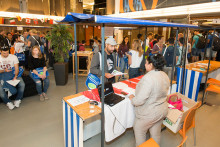‘Until recently, you could raise hundreds of thousands in research funding if you were willing to cooperate with China, with hardly any conditions attached’, AWTI chair Eppo Bruins said Wednesday evening on current affairs programme Nieuwsuur. ‘We were naive.’
Espionage, knowledge theft and covert subversion have been higher on the public agenda lately. Earlier this week, the intelligence services sounded the alarm. According to the agencies, the Netherlands is a target for China, Russia and Iran in particular.
But what can the Netherlands do? The AWTI (Advisory Council for Science, Technology and Innovation) wanted to know how other countries were tackling the problem and asked the Leiden Asia Centre to conduct a comparative study.
The centre examined nine countries in total. Of the European countries, France, Germany, Finland, the Czech Republic and the UK were included in the study. The researchers also looked at the US, Australia, Japan and Taiwan.
Dubious role
Most countries now appear convinced of the importance of knowledge security. The Czech Republic is more divided on the issue, according to the researchers, leading to less coherent policy.
In some instances, they write, national politics play a dubious role in the choices being made, producing policies designed not only to address actual risks, but also to advance the political agendas of certain political parties. This leads the researchers to their first conclusion: consistency is desirable and political opportunism should be avoided.
Incidentally, not all countries use the term knowledge security. Some talk about foreign interference, others about scientific integrity (more broadly defined than in the Netherlands). Elsewhere, the discussion centres around topics like academic freedom and the protection of science.
China
But generally speaking, all knowledge security policies focus on four things: raising awareness, exposing threats, avoiding risks and at the same time reaping the benefits of international cooperation.
Some countries have made more progress than others. Japan, Taiwan and Australia’s close geographical proximity to China is an important factor in their policymaking. For Taiwan, which is considered a renegade province by China, knowledge security is vital to its survival as a country.
In Finland, the primary focus is on an awareness campaign, while France’s policy mainly addresses risks. Comparing these different policies, the centre’s conclusion is simple: find the right balance.
No evaluations
But how well do these policies actually work? Nowhere have the measures been evaluated yet, according to the study. In most countries, it is still too early to draw conclusions about effectiveness.
The researchers do venture a general recommendation: ensure consistency and keep it practical. Regulations should be clear and precise, and government and research funders should provide easily accessible help. Competition among universities in recruiting foreign students seems ill-advised.
‘Extreme positions’
The AWTI is using the study to advocate for awareness, but also for nuance. International cooperation is crucial for the Netherlands, the report says, despite the very real risks. The advisory council warns against ‘extreme positions’.
‘Dutch knowledge institutions are among the best in the world’, said AWTI board member and project leader Chokri Mousaoui in a press release. ‘Many of our researchers and students work together with their international counterparts, and we should definitely keep it that way. This is about finding the right balance between naivety and an excessive focus on security.’
The AWTI praises the government’s recently established knowledge security desk, but also advocates for strengthening knowledge security teams at universities and more scientific research on knowledge security.







